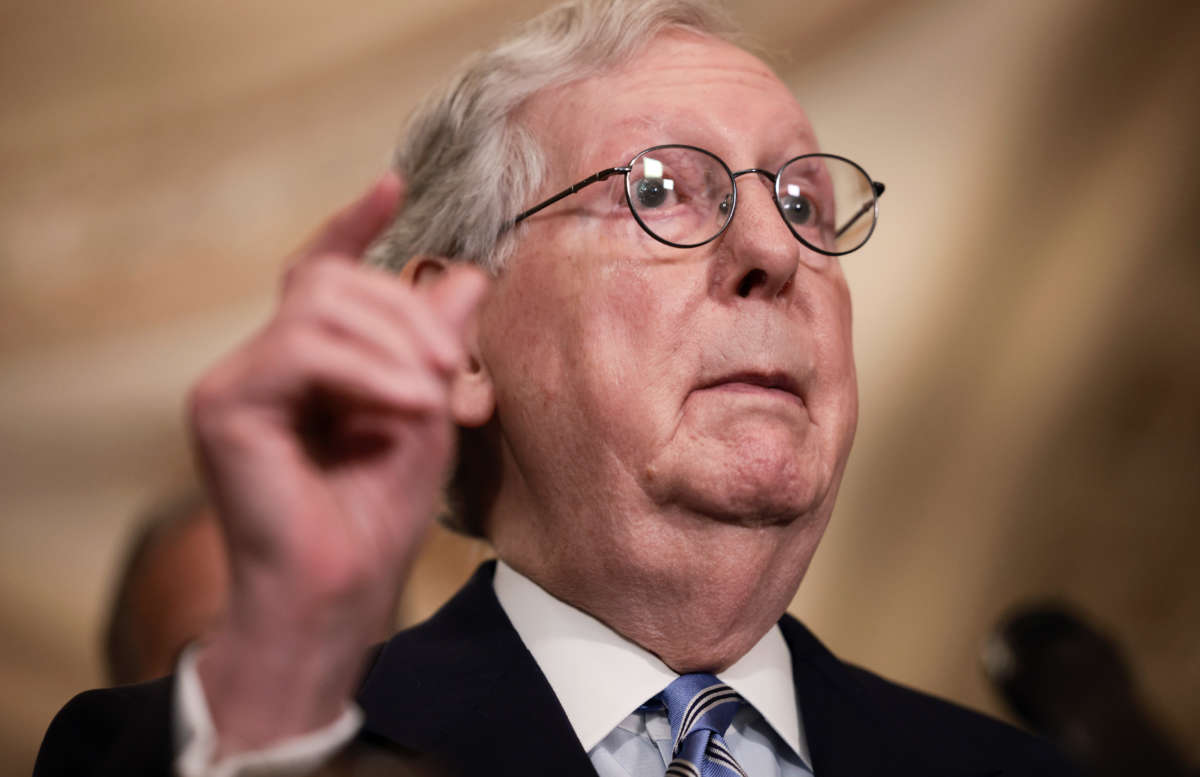Did you know that Truthout is a nonprofit and independently funded by readers like you? If you value what we do, please support our work with a donation.
Senate Republicans will allow a vote on raising the debt ceiling, averting a crisis that would have seen the United States government defaulting on its debt obligations for the first time in its history.
Although Republicans have blocked every effort to raise the debt ceiling since last month — and though much of the debt was incurred due to deficit spending under former President Donald Trump — Senate Minority Leader Mitch McConnell’s (R-Kentucky) statement announcing his party’s decision to agree to raise the debt ceiling sought to blame Democrats for the crisis.
“To protect the American people from a near-term Democrat-created crisis, we will also allow Democrats to use normal procedures to pass an emergency debt limit extension at a fixed dollar amount to cover current spending levels into December,” McConnell said.
Had the debt ceiling not been raised by a mid-October deadline, the U.S. government would have defaulted on its debts, which economists have warned would likely result in a recession.
Treasury Secretary Janet Yellen expressed similar concerns about the economy, saying in an interview on CNBC on Tuesday that it would be “catastrophic to not pay the government’s bills, for us to be in a position where we lacked the resources to pay the government’s bills.”
“I fully expect it would cause a recession as well,” Yellen added.
The deal, if agreed upon by Democratic lawmakers, would end the standoff to raise the debt ceiling that has spanned the past month. But the victory would only last a couple of months, and the debate surrounding raising the debt ceiling would resume in December.
McConnell’s announcement came after his previous offer to expedite the reconciliation process as means of staving off the debt crisis. But according to CNN’s Manu Raju, the Senate Minority Leader’s shift was inspired in part by Democrats’ threat to change filibuster rules in order to raise the debt ceiling, as well as pressure placed on centrist Democrats to acquiesce.
“McConnell told his colleagues he’s concerned about pressure on [West Virginia Sen. Joe] Manchin and [Arizona Sen. Kyrsten] Sinema to gut filibuster in order to raise debt ceiling, I’m told,” Raju wrote in a tweet.
Although Manchin said earlier on Wednesday that he was opposed to removing the Senate filibuster as a strategy to raise the debt limit, President Joe Biden endorsed a plan to do so, telling reporters yesterday that there was a “real possibility” of that taking place.
The debate around ending the filibuster to raise the debt limit may come up when the debt ceiling is brought up again in December. It’s also possible that Democrats may try to end the need for Congress to raise the debt ceiling at all, and instead advocate for the action to be automatic.
A terrifying moment. We appeal for your support.
In the last weeks, we have witnessed an authoritarian assault on communities in Minnesota and across the nation.
The need for truthful, grassroots reporting is urgent at this cataclysmic historical moment. Yet, Trump-aligned billionaires and other allies have taken over many legacy media outlets — the culmination of a decades-long campaign to place control of the narrative into the hands of the political right.
We refuse to let Trump’s blatant propaganda machine go unchecked. Untethered to corporate ownership or advertisers, Truthout remains fearless in our reporting and our determination to use journalism as a tool for justice.
But we need your help just to fund our basic expenses. Over 80 percent of Truthout’s funding comes from small individual donations from our community of readers, and over a third of our total budget is supported by recurring monthly donors.
Truthout has launched a fundraiser to add 340 new monthly donors in the next 5 days. Whether you can make a small monthly donation or a larger one-time gift, Truthout only works with your support.
